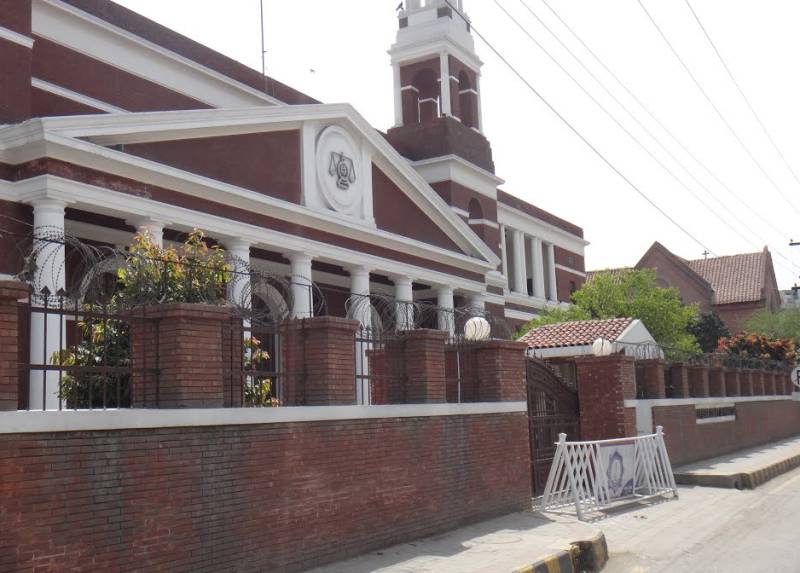LAHORE: A two-member bench of the Supreme Court on Saturday stopped all universities across the country from granting affiliation to new law colleges till further orders.
The bench, headed by Chief Justice Mian Saqib Nisar, passed these orders while hearing a petition, filed by Pakistan Bar Council regarding mushroom growth of law colleges.
As the proceedings began, Vice Chancellor Punjab University appeared before the bench and submitted that 35 law colleges were affiliated with the university. He submitted that affiliation was granted on fulfilling the requirements including faculty, infrastructure, class rooms and others. He submitted that the colleges were also inspected once a year.
To a query, he submitted that he had been appointed vice chancellor on provisional basis and he took charge a few days ago.
At this, the chief justice summoned chief secretary Punjab to know further developments in this regard.
Advocate Anwar Kamal, head of committee formed by the Lahore High Court (LHC) for inspection of law colleges in Punjab, submitted that 25 law colleges had been inspected so far. He briefed the bench about various reasons including faulty examination system for decline in quality of legal education.
Senior Advocate Hamid Khan and Azam Nazir Tarar also briefed the court in this regard.
At this, the chief justice observed that now all legal education matters pending before the high courts would be heard by the Supreme Court. He asked Hamid Khan and other senior lawyers to present recommendations for improvement of the system and observed that the same would be implemented after hearing other stakeholders. The CJP observed that he wanted to streamline the legal education system within six weeks.
To which, Hamid Khan suggested that like the LHC committee, bodies for Khyber-Pakhtunkhwa, Sindh and Balochistan should also be formed.
Chief Secretary Punjab Zahid Saeed also appeared on being summoned by the bench and submitted that a new search committee had been formed for appointment of permanent vice chancellor of the Punjab University and an advertisement would be published, seeking applications in two weeks.
He explained that the previous search committee failed to reach any consensus. At this, the chief justice directed chief secretary to provide details of vice chancellors appointed on provisional basis to the public sector universities and how much time would be required for appointment of permanent vice chancellors.
The chief justice asked Hamid Khan and other senior lawyers to recommend names for appointment as members of the committees for the other provinces till Sunday. The chief justice also sought details from vice chancellors about the affiliated law colleges and requirements for the purpose on affidavits, within 10 days.
Meanwhile, the bench also sought response from the Lahore Medical and Dental College (LMDC) on reports, submitted by the committee formed by the bench for its inspection, till Monday.
The bench passed these orders while hearing a suo motu notice on excessive fees being charged by the private medical colleges.
Earlier, Advocate Ayesha Hamid, assisting the court, submitted that the committee formed by the bench visited the LMDC and members had submitted their reports individually for perusal. However, she said that the LMDC had excellent infrastructure and laboratories and the equipments were also found in order.
Prof Dr Faisal Masood, a member of the committee, pointed out some deficiencies found during inspection.
At this, the chief justice sought repose from the LMDC on the committee report for handing over the same to Pakistan Medical and Dental Council (PMDC) ad hoc council.
Advocate Ayesha Hamid also apprised the bench about disposal of hospital waste and capacity of incinerators installed for disposal of public hospitals' waste.
Secretary Environment Protection Department (EPD) Najam Saif also briefed the court about incinerators, installed in public and private sector. But, the chief justice expressed annoyance over the performance of the EPD and sought complete details regarding hospital waste disposal.
The chief justice also directed Advocate Latif Khosa, who appeared on court's call that Dr Asim Hussain should be conveyed to ensure his appearance before the bench for input on private medical colleges issue.
Meanwhile, the bench remarked that 24 water filtration plants, sealed by the Punjab Food Authority would not be made operational without its permission. The bench passed these remarks while hearing suo motu notice case regarding provision of clean drinking water.
Earlier, Chief Secretary Punjab Zahid Saeed apprised the bench that reports had been submitted before the bench about water samples obtained from 139 tubewells and 79 consumers.
He submitted that the PCSIR had formed a team and it was tasked to collect samples and analyse them. He said that a month's time would be required for compiling further results in this regard.
He stated that water samples were also obtained from 127 tubewells and 374 consumers for checking arsenic presence and except for five consumers, arsenic level was found within limits in the collected samples. He said that the said five consumers would be checked again.
To which, the chief Justice asked the PCSIR for speeding up the work and submitting complete reports within 15 days.
To a court query, the chief secretary stated that some facilities had been established in Multan, Pattoki and Faisalabad for disposal of effluent water. He further submitted that a memorandum of understanding (MoU) had been signed with a Turkish company for PC-1 of three effluent disposal projects.
Director General Punjab Food Authority Noor-ul-Amin Mangel submitted that 130 samples of bottled water and filtration plants had been submitted to the PCSIR for analysis. He said that 24 filtration plants located in different parts of the city had been sealed after their results were found unsatisfactory.
At this, the bench observed that these filtration plants would remain sealed and they would not be made operational without the court orders.






